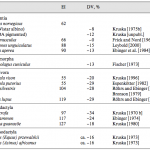Brain and Behavior
Student guest post by Zainab Khan
Schizophrenia has puzzled and often times scared not only the scientific community, but also the general public since its emergence. Cases of schizophrenia-like behavior have been well documented in history. As this disease has been studied, factors such as genetics, environment, and even personal habits have all been associated to some degree with schizophrenia. However, evidence in past years has mounted showing an association between infectious agents and schizophrenia. The three main infections associated/studied with schizophrenia have been…
Light interacts with and controls biological systems in diverse and fascinating ways. Our eyes are made up of thousands of cells that respond to light, sending signals to our brain as light in different colors and shapes moves across them. Photosynthetic cells are full of receptors that can sense and respond to many wavelengths of light, allowing cells to absorb light for photosynthesis, but also to move towards areas of more sunlight and know when the seasons are changing. Synthetic biology takes these light-responsive systems as parts that can be recombined, shuffled and integrated into…
Student guest post by Laura Vonnahme
As a part of traveling to a developing nation, we are often required to take medical precautions. This generally includes a line-up of shots for various diseases, a few other tests, and various regimens of prophylaxis for possible diseases. I have often left these doctors appointments with a line of band-aids on my arm, a handful of prescriptions and a little weakness in my knees. However, I will readily admit that my malaria prophylaxis is often pushed to the back burner; in fact the last time I went to a developing nation, I didn't even get the malaria…
Dog owners have a way - sometimes within DAYS of first becoming dog owners - of becoming EXPERTS on animal behavior. It blows my mind. These are people who observe their animals displaying interesting or curious behaviors and make up things like "dogs like being put in tiny cages, actually, because of when their ancestors were pack animals and lived in caves."
Figure 1: Do they look happy to you? I didn't think so.
That said, a reader sent me an email inquiring about a particular behavior that she has observed in her female poodle. This reader is not one of the above-described self-…
Down on the left sidebar you'll see a little gizmo for SiteMeter, a service that measures one's blog traffic and gives all sorts of tidbits about how readers got to the blog and a very general idea of where they are coming from. Most bloggers pay attention to the numbers of visitors but I have always been more interested in how readers get here and what posts they are reading.
One value of SiteMeter is to keep tabs on search terms that bring people here to learn of breaking stories. So, when I saw a bunch of hits starting yesterday with search terms like "hydrogen sulfide," I feared the…
He seems very surprised. I guess it's something he's never experienced before.
Chopra has a little story to tell. It seems colobus monkeys have discovered that eating charcoal absorbs some of the irritating toxins in their diet, so the monkeys have been chowing down on the stuff for several generations. This is cool and clever, but not at all surprising — organisms adapt and take advantage of their environment all the time. But Chopra being Chopra has to put a very weird spin on it.
He argues that the behavior isn't genetic, because it's too recent — not quite right, novel mutations have to…
The party isn't over yet! Here's another helping of Monday Pets. Enjoy!
Wild Dog crawled into the Cave and laid his head on the Woman's lap... And the Woman said, "His name is not Wild Dog any more, but the First Friend."
--Just So Stories, Rudyard Kipling.
Archaeological evidence indicates that dogs were already a part of human society around the end of the Ice Age. Small dog skeletons have been unearthed in human communities as far back as 6- to 12-thousand years ago in Europe, the Middle East, and China. The jawbone of a domestic dog was found in a late Paleolithic grave in Germany, and…
Welcome to the new home for The Thoughtful Animal!
Welcome especially to new readers! To the old readers, I hope you'll enjoy the new place. Nothing big will change; but now I've got better technical support, a family of Sciblings (go check out their blogs!), a more powerful interface, and hopefully a more pleasant experience for you!
Take a few minutes to check out the site. You can read a little about me, and if you'd like you can peruse the old blog. I shall miss the old place, but am very excited to be joining the Borg Scienceblogs, and all my new Sciblings. Special thanks go to Dr. Isis…
Welcome to the new home for The Thoughtful Animal!
Welcome especially to new readers! To the old readers, I hope you'll enjoy the new place. Nothing big will change; but now I've got better technical support, a family of Sciblings (go check out their blogs!), a more powerful interface, and hopefully a more pleasant experience for you!
Take a few minutes to check out the site. You can read a little about me, and if you'd like you can peruse the old blog. I shall miss the old place, but am very excited to be joining the Borg Scienceblogs, and all my new Sciblings. Special thanks go to Dr. Isis…
Reader Jason commented on my post about compulsory smiling thusly:
I just wanted to thank everyone for the comments here. They've been enlightening... to be honest I had never heard of anyone being ordered to smile outside of greeter/public relation jobs (chalk it up to youthful naivete, I suppose). With that in mind when I first read the post it struck me as an overreaction to something minor, but it's hard to argue with a few dozen women from all over with the exact same stories and reactions.
I don't know if I've ever been guilty of this behavior in my life (I hope not, though I am a…
A leopard (Panthera pardus). Image from Wikipedia.
SK-54 is a curious fossil. The 1.5 million year old skullcap represents a juvenile Paranthropus robustus, one of the heavy-jawed hominins which lived in prehistoric South Africa, but there is something that makes this skull fragment particularly special. Near one of the sutures along the back of the skull are two neat puncture marks, the hallmark of a leopard.
Even though it was initially proposed that SK-54 had been murdered by another australopithecine wielding a weapon of bone or horn, in the late 1960's the paleontologist C.K. Brain…
Bad medical ideas often start with good intentions. Most doctors are interested in preventing and treating disease, and some diseases are particularly challenging. Some rise to this challenge, forming clever hypotheses and finding accurate ways to test them, but others aren't so successful. Sometimes, hypotheses are too implausible to be worth spending much time on. Sometimes, the method used to test a hypothesis is simply not valid.
This story begins on the website Age of Autism. AoA is one of the homes of the antivaccination movement and gives a lot of time to those…
The UCLA chapter of the pro-science organization Pro-Test has announced its second major rally to show support for science and to stand up against the ongoing campaign of intimidation being waged by animal rights activists. The organization originated in Oxford in 2006 during a streak of particularly nasty actions by animal extremists, and the UCLA chapter held their first rally about a year ago in response to the escalating threats and destruction of property aimed at animal researchers in the US.
The next rally is scheduled to start at 11:30 am, on Thursday, April 8th. It will convene on…
Let's begin with this recent experiment by neuroscientists at Rutgers, which demonstrated that general intelligence (at least in rodents) is mediated by improvements in selective attention. Here's the abstract:
In both humans and mice, the efficacy of working memory capacity and its related process, selective attention, are each strongly predictive of individuals' aggregate performance in cognitive test batteries. Because working memory is taxed during most cognitive tasks, the efficacy of working memory may have a causal influence on individuals' performance on tests of "intelligence".…
There are 63 new articles in PLoS ONE today. As always, you should rate the articles, post notes and comments and send trackbacks when you blog about the papers. You can now also easily place articles on various social services (CiteULike, Mendeley, Connotea, Stumbleupon, Facebook and Digg) with just one click.
Note: you may have noticed that today's papers were not published last night as you are used to seeing them. Starting today, PLOS ONE papers are published online on the same date as the official publication date (at or close to 2pm Pacific, 5pm Eastern, I believe). That same date/…
So the other day Sam Harris was asked to speak to the TED conference, and he presented what he believes to be a basis for scientifically validating morals and values. This is interesting, as most people who've studied the issue have concluded, for pretty compelling reasons, that this is not the sort of thing that's really possible.
Now, I haven't seen Harris's talk, as I don't care for watching YouTube and it's not a form well-suited for evaluating what would be, if true, a fairly radical discovery. The thing is, skepticism gives you a toolkit for addressing such circumstances. When…
Domestication is by far man's greatest genetic experiment, and we've been at it for well over 10,000 years. While domestication can produce wild variation (see my post on dogs, for example), a few changes seem to be universal. These include behavioral changes, like reduced fear of humans and friendliness, as well as physiological ones, like floppy ears (they develop in domesticated foxes, too). One of the most well-documented differences between domesticated animals and their wild counterparts is their brains: across every species that has been looked at, the brains of domesticated animals…
There are 9 new articles in PLoS ONE today. As always, you should rate the articles, post notes and comments and send trackbacks when you blog about the papers. You can now also easily place articles on various social services (CiteULike, Mendeley, Connotea, Stumbleupon, Facebook and Digg) with just one click. Here are my own picks for the week - you go and look for your own favourites:
Delimiting Species without Nuclear Monophyly in Madagascar's Mouse Lemurs:
Speciation begins when populations become genetically separated through a substantial reduction in gene flow, and it is at this…
In this diavlog with Glenn Loury the behavioral economist Sendhil Mullainathan recounts the results of an experiment.
- If given the option of paying $100 for an item vs. $80 for an item, but in the second case having to go across town for the item, respondents choose $80 and going across town
- If given the option of paying $1000 for an item vs. $980 for an item, but in the second case having to go across town for the item, respondents choose $1000 and not going across town
This the result of a heuristic bias whereby we seem to perform comparisons as percentages, and not the absolute value…
This is the first time ever that I cared about SXSW conference or was jealous for not being there. Watching the blogs and Twitter stream, it appears to have been better and more exciting than ever. I guess I'll have to figure out a way to finally get myself there next year....
But this post is not really about SXSW. It is about presenting at such conferences. More specifically, how the back-channel (on Twitter and elsewhere) affects the way one needs to approach an invitation to speak at meetings where much of the audience is highly wired online: to say Yes or No to the invitation in the…






